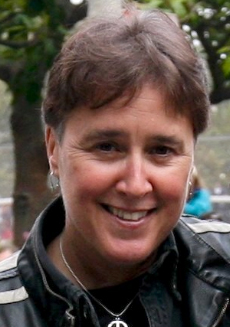Not many filmmakers can claim that they got their start in an auto shop. Glenne McElhinney is one of the few who sharpened her teeth not at film school or even college, but rather out working for decades as an auto mechanic.
“I was in the automotive industry for many, many years.” McElhinney said.
Born in San Francisco, McElhinney found her true calling only two years ago while watching a film about gay and lesbian history. Her own film, “On These Shoulders We Stand,” is now considered a part of California history and will be housed in UCLA’s archives.
“I saw the movie “˜Paragraph 175′ and that’s what changed my life, that’s what made me decide to change careers,” McElhinney said. “I decided to get into becoming an oral historian.”
The film details the Nazi persecution and encampment of gays, who had been living relatively at ease before the Third Reich.
“It’s a hard movie to watch, but that’s the movie that inspired me to switch careers and become an oral historian and ultimately a filmmaker,” McElhinney said.
It was this moment that McElhinney drastically changed her career’s direction.
“I had nothing,” she said. “I have no history background or anything, no idea where to start. So I just hit the Web and started cold calling history professors in the San Francisco area, I just started looking them up online. They were so sweet. … They said, “˜Yeah, we’ll help you out. Here’s the books to read and the courses to take and the people to talk to.'”
By taking night classes and attending group meetings recommended by these professors, McElhinney climbed the ladder and became somewhat of an expert on lesbian, gay, bisexual and transgender culture and the way to record history.
Then, in 2009, she decided to embark on another adventure and make a documentary film.
“On These Shoulders We Stand” takes 11 members of the gay and lesbian community who grew up in the Los Angeles area from the 1950s to the 1980s. Their trials and difficulties in gaining acceptance from peers, family and, most importantly, the police are chronicled in their own words.
Despite McElhinney’s lack of prior experience, the film has garnered appreciation among the lesbian, gay, bisexual and transgender community and is reaching audiences throughout California. It also won the Special Programming Award for Freedom at the Outfest Awards last year.
The impact of this film is important for California as a whole, as the San Francisco area often receives the most awareness as a community of gay acceptance. Ardel Thomas, chair of lesbian, gay, bisexual and transgender studies at City College of San Francisco, said this is a significant film, especially for those living in Southern California.
“”˜On These Shoulders We Stand’ helps to bring LGBT political activity out of the proverbial closet there in L.A. Again, we like to think of Northern California and Southern California as almost separate countries, if you will. And, culturally, they are extremely different places,” Thomas said.
“This film sheds light on forgotten activists and workers for social justice who are there in L.A. and who take great pride in being part of the movement in Southern California.”
Dale Reynolds, who tells his story in “On These Shoulders We Stand,” said he found McElhinney to be very professional, which he thought benefited the film.
“She allowed us to talk, at length, about our experiences,” Reynolds said. “She was excellent at what she did, considering it was a first-time film. It was quite amazing how it turned out, and it taught me things I didn’t know. … I didn’t know about the L.A. experience, so that was all just terribly interesting.”
His whole life, Reynolds has experienced the sort of discrimination other minorities have had to overcome and has learned to accept that the world is not yet tolerant of the gay community.
“Somebody at one of the screenings said “˜Well, you guys are heroes,’ and I went, “˜No, that’s not how we look at it.’ In the same way, I was in the Vietnam War ““ … not a hero, just there doing what you do. … (It’s) not humbleness, it’s just a reality. You just do it,” Reynolds said.
“We’re looking at a marvelous change in the United States, that soon marriage will be fine, and the gays in the military will be fine, … and it’s wonderful. But it takes time because people have to hold to their insecurities, and that’s what they do.”
